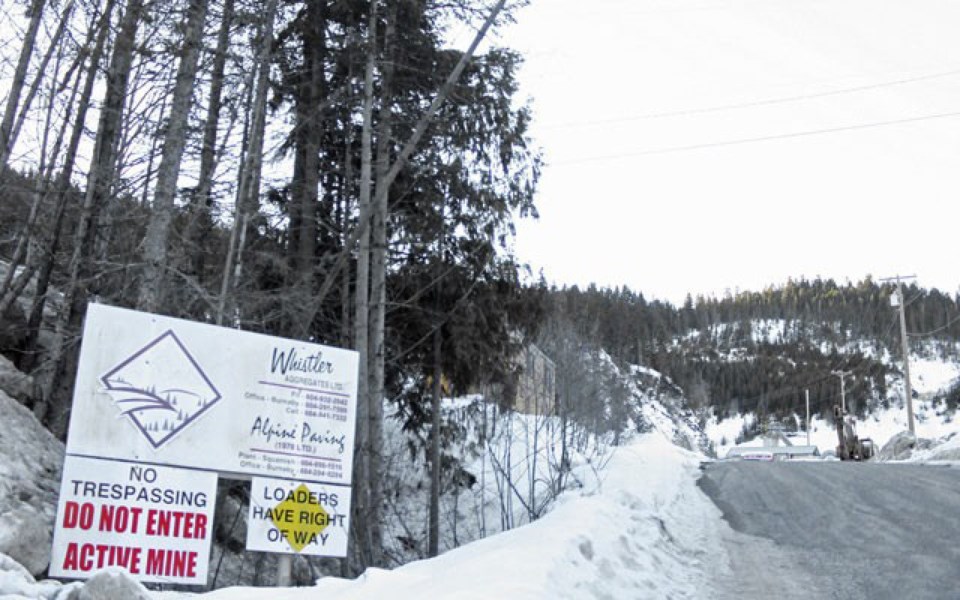After a lengthy discussion at the June 9 council meeting, Whistler council decided in a split vote to change its asphalt procurement policy to allow sourcing from Cheakamus Crossing, with a pledge to revisit the issue in a year.
Since 2011, council has directed staff to include a restriction on sourcing asphalt from facilities located within three kilometres of Whistler neighbourhoods.
As such, council has required perennial contract winner Alpine Paving to source asphalt for municipal works from its Squamish plant rather than its plant in Cheakamus.
The policy has generated 270 tonnes of CO2, representing between two and five per cent of the municipality's annual corporate emissions, depending on the year, and cost an estimated $456,000 more than if it were sourced locally over that time, according to the RMOW.
Council received 14 letters of correspondence from Cheakamus residents before the meeting—which Councillor Ralph Forsyth pointed out would likely equate to 100 angry residents showing up in person if not for COVID-19 taking council meetings virtual.
"The reason we're here talking about it now is because in the dying days of the 2011 council, everyone was trying to save their skins and come up with any idea to get people on our side again or get them off our backs," said Forsyth, who sat on the 2011 council that infamously lost favour with voters. "There was no logical reason for us to make this procurement policy other than it was good politics, we thought. It wasn't, and it didn't work then, so now I think that I'm going to support this."
While the original decision came after numerous complaints from residents over air quality in the neighbourhood, the municipality's monitoring has shown that particulate levels never exceeded provincial guidelines during that time, except on days when wildfire smoke blanketed the community.
The plant produces about 21,000 tonnes of asphalt per year on average, and with the RMOW's estimated 5,000 tonnes per year, "we'd be adding just, on average, 20 to 30 per cent more to that plant's production," noted capital projects manager Tammy Shore.
But it was a difference in the particulate matter measured at stations in Cheakamus and Meadow Park that eventually swayed Coun. Cathy Jewett.
"Until then, I had to admit I was a little more on the pro side, and now, looking at that, I think that when I see that there's poorer air quality in that neighbourhood versus the neighbourhood I live in, that had a huge effect on my decision making," Jewett said, before eventually voting against the resolution (Coun. Jen Ford was also opposed).
The letters council received on the issue are passionate, "but they also have a bit of an edge," Jewett added.
"I would like to advise the residents of Cheakamus Crossing to write to the regional manager of [the Ministry of Forests, Lands and Natural resource Operations], and to the minister, and to be respectful, and to resist the urge to [be cynical] and remain professional.
"That's the way that we're going to be able to really solve this, is we have to go to who's in charge."
With the province renewing the plant's lease for 10 years in 2017, Coun. Arthur De Jong reasoned the best approach is the long game.
"We need to look long term. The licence ends in 2027; we need to build a vision with the operator," De Jong said, noting that the site could eventually be graded for an employee housing project or other residential uses.
"We need to build a vision of moving out of there, because it just doesn't belong on the edge of this growing community."
An amendment introduced by Coun. Duane Jackson pledged to revisit the decision in a year, in the meantime directing staff to continue air quality monitoring, request consolidated production days with other projects, and encourage ongoing dialogue with the owner on best practices for the site around things like dust mitigation.
"My focus remains on seeing the plant moved ... (but) provincial jurisdiction means moving the plant is not likely unless Alpine Paving is willing to do so," said Mayor Jack Crompton. "Adversarial strategies, litigation, lobbying the province, and this procurement policy have not resulted in the plant being moved. Trying collaboration with Alpine Paving seems reasonable to me, and what has been recommended seems worth a try."




